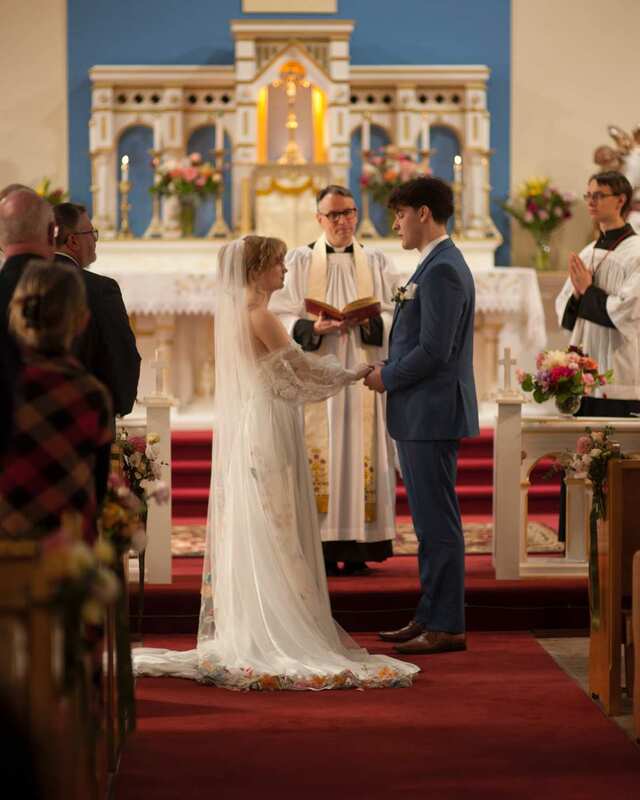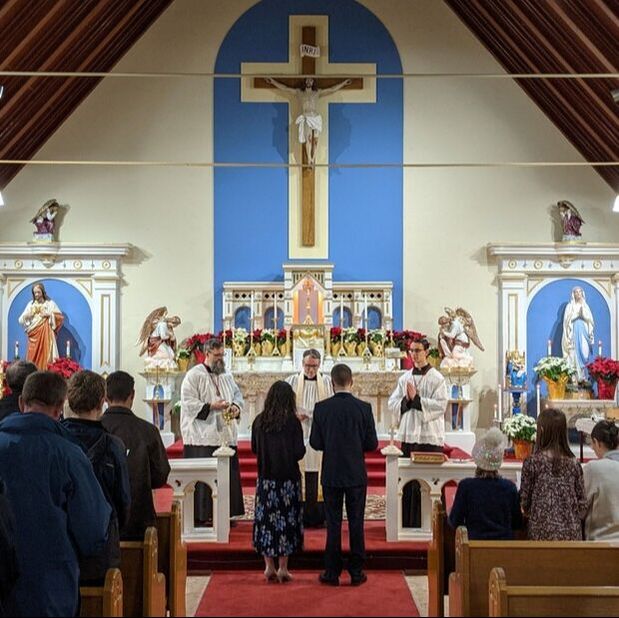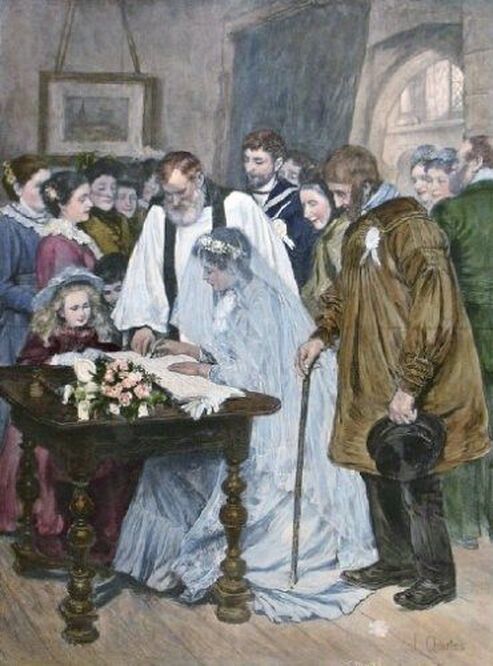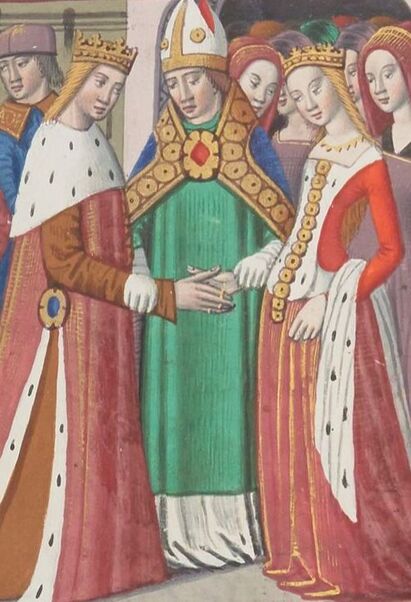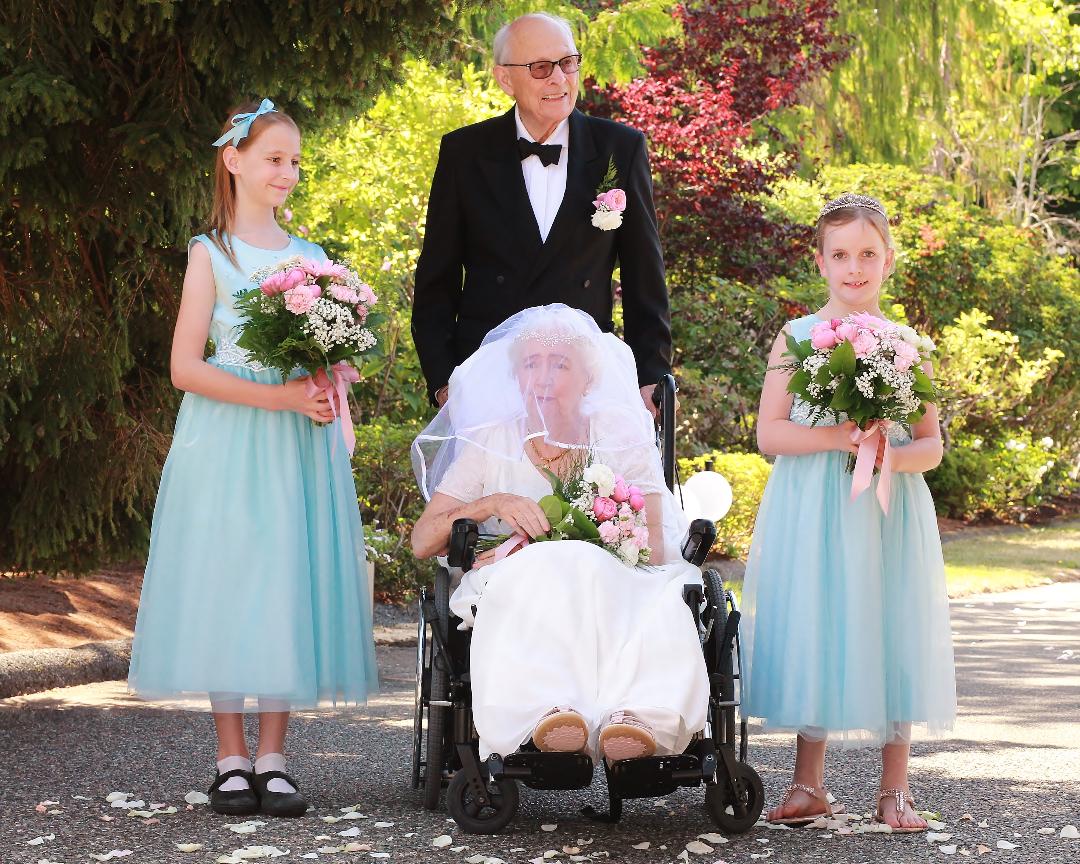All information regarding the necessary civil paperwork can be found here.
For the full selection of readings for Holy Matrimony, please see: Lections (Weddings) here.
For the full selection of readings for Holy Matrimony, please see: Lections (Weddings) here.
Holy Matrimony
|
GETTING MARRIED is one of the most significant steps in anyone’s life; perhaps the most significant. Two people make vows to each other, before God, to remain exclusively together for the rest of their lives ‘for better, for worse: for richer, for poorer; in sickness and in health; to love, cherish, and to obey, till death us do part, according to God’s holy law.’
Married Christians, in virtue of the sacrament of Holy Matrimony, signify and share in the mystery of that unity and fruitful love which exists between Christ and his Church (Ephesians 5.32); they help each other to attain to holiness in their married life and in the rearing and education of their children; and they have their own special gift among the people of God. (1 Corinthians 7.7) ‘The matrimonial covenant, by which a man and a woman establish between themselves a partnership of the whole of life, is by its nature ordered toward the good of the spouses and the procreation and education of offspring; this covenant between baptised persons has been raised by Christ the Lord to the dignity of a sacrament.’ (Code of Canon Law 1055) |
In celebrating the sacrament of Holy Matrimony, Christians proclaim the communion of love between Christ and the Church and ask God’s blessing that their nuptial union might be the sacramental sign of this same love.
The Catholic Church’s understanding of marriage is that it is a unique, indissoluble partnership between one man and one woman, in mutual and lasting fidelity and open to the possibility of bringing children into the world. Anyone getting married in a Catholic church must have the same understanding of marriage as the Church, even if they are not a Catholic themselves.
It is because the Church attaches such importance to marriage, both for the couple themselves and for society as a whole, that she is concerned that couples intending to marry are adequately prepared, and understand what it is that they are committing themselves to.
These notes are intended to help couples thinking about getting married at St John Henry’s. The priest who is marrying you will want some time to get to know you, to make sure you understand the meaning and obligations of marriage, and to help you plan the service so as to make one of the most important days of your lives as good as it can be.
If you are thinking of getting married at St John Henry’s, please read these notes and then get in touch with Fr Kenyon for an initial chat. And please spend some time in prayer, so as to be able to make the right decisions for one another.
Please also read Bishop Lopes’ Pastoral Letter on Marriage, A Pledged Troth, which can be accessed here.
The Catholic Church’s understanding of marriage is that it is a unique, indissoluble partnership between one man and one woman, in mutual and lasting fidelity and open to the possibility of bringing children into the world. Anyone getting married in a Catholic church must have the same understanding of marriage as the Church, even if they are not a Catholic themselves.
It is because the Church attaches such importance to marriage, both for the couple themselves and for society as a whole, that she is concerned that couples intending to marry are adequately prepared, and understand what it is that they are committing themselves to.
These notes are intended to help couples thinking about getting married at St John Henry’s. The priest who is marrying you will want some time to get to know you, to make sure you understand the meaning and obligations of marriage, and to help you plan the service so as to make one of the most important days of your lives as good as it can be.
If you are thinking of getting married at St John Henry’s, please read these notes and then get in touch with Fr Kenyon for an initial chat. And please spend some time in prayer, so as to be able to make the right decisions for one another.
Please also read Bishop Lopes’ Pastoral Letter on Marriage, A Pledged Troth, which can be accessed here.
|
|
Anglican Patrimony‘While Divine Worship attempts to preserve a consistency with the Prayer Book tradition, the process of elaborating and approving these texts for Catholic worship did require some modification of the marriage rite so as to ensure a closer conformity to Catholic doctrine and canonical form. The rubrical directory which introduces Divine Worship: Order of Solemnisation of Holy Matrimony makes clear, for example, that the celebration of Marriage between two baptised persons ordinarily takes place during Mass because of the intimate connection of the sacrament with the Paschal Mystery of Christ.
|
The self-offering of Christ for the Church actualised in the Eucharist is understood the shape and foundation of the marital covenant which is actualised in the consent of the spouses to give themselves to each other, a perspective underscored by explicit reference to The Catechism of the Catholic Church.
|
The very first element of Divine Worship: Order of Solemnisation of Holy Matrimony is the Admonition and Scrutiny in which the ends of marriage are rather forthrightly proclaimed and the persons to be married are publicly asked about any impediments to their marriage. Even when celebrated during a nuptial Mass, the rite begins with this Admonition and Scrutiny and only if no impediment is alleged does the Mass continue. The Rite for the Solemnisation of Holy Matrimony follows the Liturgy of the Word and consists of the Profession of Intention, the Exchange of Consent, and the Blessing and Exchange of Rings. Mirroring the Roman Rite, the Nuptial Blessing occurs after the Eucharistic Canon and the Lord’s Prayer and is completed in the exchange of the Peace. The texts for the Solemnisation of Holy Matrimony during Mass also include a Final Blessing of the couple and the congregation.’ - Bishop Steven Lopes
|
BetrothalWhilst preparation for marriage follows an engagement, a Solemn Rite of Betrothal, in which the couple present themselves to ‘ratify in solemn manner the engagement bespoken’, may be requested of the Parochial Administrator. Betrothal is a more formal commitment than an engagement, which signifies intention to marry, whereas betrothal is a more serious contractual promise to marry.
The rite, performed either publicly or in private, involves the man and woman promising before witnesses and the Church to wed, the blessing of the engagement ring and the couple, and the solemn bestowing of the ring to the fiancée. This liturgical formula anticipates the Rite of Holy Matrimony. |
Preliminaries
Marriages at St John Henry’s are, as a rule, restricted to couples where at least one of you is a member of the Personal Ordinariate of the Chair of St Peter. For those of you who are Latin Rite Catholics and have a strong connection with St John Henry’s, a wedding service is possible, but permission will first need to be obtained from your territorial Latin Rite parish. If you do not know what this is you will need to contact the Pastoral Centre (for the Diocese of Victoria) at 250.479.1331. Wedding services at St John Henry’s are celebrated according to Divine Worship: Occasional Services, the Ordinariate’s official public liturgy, for members of the Ordinariate only.
You need to give six months’ notice prior to getting married at St John Henry’s. This is to make sure there is enough time to complete all that is required before the day:
Preparation. A period of preparation with the priest who will marry you and attendance at our six week Fit for Mission? Marriage Preparation Course, written by Bishop Patrick O’Donoghue, late Bishop of Lancaster, England, and published by the Catholic Truth Society. The course will be held at a time that is agreeable to yourselves and to the priest preparing you for marriage. The course takes a couple through the richness of Catholic teaching on marriage and the lived experience of other couples living out their married life in faith. No details of your wedding can be fixed until this course has been completed.
You need to give six months’ notice prior to getting married at St John Henry’s. This is to make sure there is enough time to complete all that is required before the day:
Preparation. A period of preparation with the priest who will marry you and attendance at our six week Fit for Mission? Marriage Preparation Course, written by Bishop Patrick O’Donoghue, late Bishop of Lancaster, England, and published by the Catholic Truth Society. The course will be held at a time that is agreeable to yourselves and to the priest preparing you for marriage. The course takes a couple through the richness of Catholic teaching on marriage and the lived experience of other couples living out their married life in faith. No details of your wedding can be fixed until this course has been completed.
|
Details of the Marriage Service. The Parish Administrator, Fr Kenyon, will need to see you several times before the service to discuss the exact details of your wedding service, as well as to take you through the rehearsal.
Civil paperwork. One of the first things you will need to do is to purchase a Marriage Licence from Service BC, available at a local registry. Please follow the link at the top of the page for all the information you need regarding what is required. A Marriage Licence shows that you meet the requirements to get married in BC and gives you the legal right to get married any time within three months from the date the Licence was issued. When you receive your Marriage Licence you will also receive a Registration of Marriage form. This will need to be completed and signed at the time of your marriage in St John Henry’s. At the end of the wedding service the priest will give you a Marriage Statement. You can use the Marriage Statement as temporary proof of your marriage until you order an official Marriage Certificate through a registry agent. |
Freedom to Marry
You cannot be married in a Catholic church if either of you has been married before, unless that marriage has been annulled by an ecclesiastical tribunal. This rule includes civil marriages or marriages in non-Catholic churches (although in the case of Catholics who have been married in non-Catholic services a declaration of nullity may be possible).
At least one of you must be a baptised Catholic.
In cases where one of the parties has not been baptised in any Christian denomination a dispensation is required and, in such cases, a Nuptial Mass is not possible.
At least one of you must be a baptised Catholic.
In cases where one of the parties has not been baptised in any Christian denomination a dispensation is required and, in such cases, a Nuptial Mass is not possible.
The Ceremony
|
There are two forms of marriage, the Wedding Service and the Nuptial (Wedding) Mass.
The Wedding Service is shorter and consists of up to three hymns, three readings, a sermon the vows, blessing and signing of the register. The choir, soloists and the organist can also play a part. When the wedding takes place in the context of Mass, this is called a Nuptial Mass. All the usual parts of the Mass are present, readings, hymns, and a musical Mass setting. The vows are taken after the Gospel and the sermon by the priest. The registers are usually signed at the end. Where both parties (and a good proportion of the guests) will be regular, practising Catholics, a Nuptial Mass is highly recommended. It is not possible when one of the parties has not been baptised. In all other cases the Wedding Service is recommended. This service does not involve Holy Communion, so those who would be unable to receive will not feel excluded. |
The readings chosen for your wedding must be from the Lectionary. A file containing the full selection of readings is available at the top of the page.
The hymns should be from one of the hymn books in use at St John Henry’s – they contain a wide and excellent selection of traditional hymns. No secular music is permitted, save for an instrumental, which must be approved by the Parochial Administrator.
The parish will produce the order of service. This will include the texts of the liturgy, the hymns and the readings.
It is advised that you select two ushers to distribute orders of service and to direct guests to their places in church.
The hymns should be from one of the hymn books in use at St John Henry’s – they contain a wide and excellent selection of traditional hymns. No secular music is permitted, save for an instrumental, which must be approved by the Parochial Administrator.
The parish will produce the order of service. This will include the texts of the liturgy, the hymns and the readings.
It is advised that you select two ushers to distribute orders of service and to direct guests to their places in church.
Flowers and Confetti
Please provide your own flowers for your wedding, after discussion with Fr Kenyon.
You should provide at least two arrangements for the stands in the sanctuary. It is also possible to have flowers in front of the pulpit, or on the ends of pews.
Any pew end flowers should be removed soon after the wedding service, but we ask you to leave the flowers in the sanctuary so that the church will be decorated for the rest of the week.
Please ask your guests not to scatter confetti, rice or flower petals. These are very difficult to clear up and quickly look messy.
You should provide at least two arrangements for the stands in the sanctuary. It is also possible to have flowers in front of the pulpit, or on the ends of pews.
Any pew end flowers should be removed soon after the wedding service, but we ask you to leave the flowers in the sanctuary so that the church will be decorated for the rest of the week.
Please ask your guests not to scatter confetti, rice or flower petals. These are very difficult to clear up and quickly look messy.
Costs
No charge is made for the Sacrament of Marriage at St John Henry’s. A donation is always welcome for the maintenance and upkeep of the church, but this is at your discretion. In the case of non-parishioners seeking to be married at St John Henry’s an offering of $500 is expected to pay for preparation, cleaning, lighting and heating. Please understand that it is not a fee for the sacrament, and it may be reduced or waived in cases of hardship. For musical costs please contact the Director of Music, Scott Vannan, at [email protected] or 250.818.3796.
MusicThe music used in church should always be of a sacred nature. The reception is the place for other music.
If you are having hymns, you may choose up to three. In addition you may like to have the choir or a soloist sing at particular points in the ceremony. At a Nuptial Mass there may also be music at the offertory, at communion and for the Mass setting itself. Instrumentalists may be used. You will need an organ prelude for the entry and an organ postlude for the exit. Costs should be discussed with Director of Music (see above). |
Photography & Video
Please make sure that this is discreet during the service. Please ask the photographer or videographer to liaise with the officiating priest prior to the service.
The Wedding Rehearsal
It is our custom at St John Henry’s to have a rehearsal, either the evening before the wedding, or at some other time a few days beforehand. Obviously the bride and groom need to be there, but it also helps if the best man, the chief bridesmaid, the bride’s father (or whoever is leading her up the aisle) and any other people taking a prominent part can be there too. We practise the entry and the exit, the vows, the exchanging of rings, and the Nuptial Blessing. We can also talk about last minute details for photography, flowers, or music.
Please bring the following things with you: a copy of the order of service; the cheques for the church and the musicians, and the civil certificates.
Please bring the following things with you: a copy of the order of service; the cheques for the church and the musicians, and the civil certificates.
Renewal of VowsAt any point after marriage, but particularly on an anniversary, a couple may request a renewal of vows, which serves as a re-dedication to each other and to the promises made before God.
The thanksgiving begins with prayer for the couple, beseeching God that, ‘loving one another, they may continue in thy love until their lives’ end’. This prayer is followed by a reminder of the meaning and purpose of marriage, a Lesson, and a brief homily. The renewal of vows proper then takes place, wherein the husband and wife recite and renew the solemn vows made on the day of their wedding. A ring (or rings) are symbolically bestowed, and the couple blessed. |
Hymns, preferably those sung at the wedding, may accompany the ceremony. Guests and family members are welcome to attend, though the renewal may be performed privately.

